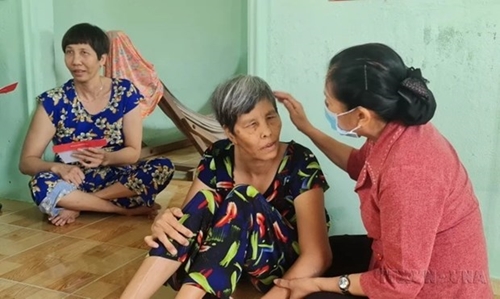    |
 |
|
AO/dioxin victims in Bac Lieu province receive care and assistance. |
The fifth VAVA Congress for the 2023-2028 tenure is taking place in Hanoi on December 28 - 29.
Reviewing the association’s performance during the 2018-2023 period, Gen. Rinh said VAVA chapters nationwide have properly submitted advice about relevant affairs to the Party, State, and all-level administrations, joined hands in addressing post-war consequences of toxic chemicals, and helped perfect the documents on support policies for AO/dioxin victims and on the settlement of toxic chemical consequences.
Communications in various forms have been boosted. The association’s emulation movement named “For the AO victims of Vietnam” has been implemented on a large scale and connected with a similar campaign launched by the Vietnam Fatherland Front Central Committee, thus yielding fruitful results.
VAVA chapters have also taken creative measures to mobilize resources for the care and support for victims, he said, noting that from the start of the fourth tenure to November 2023, they raised more than 2.27 trillion VND (93.4 million USD) in both cash and kind.
Thanks to social donations, they have spent over 2.16 trillion VND on supporting AO victims, built 3,973 houses for the target group, presented 24,550 scholarships worth over 19.58 billion VND in total to children of the victims, given free check-ups and medicines to 644,000 people, and helped thousands of victims to develop livelihoods and seek jobs, he continued.
In addition, the struggle for justice for AO/dioxin victims has been promoted with new forms and measures adopted in conformity with the Party and State’s viewpoint, guideline, and foreign policy, thereby helping improve the U.S. Congress and Government’s awareness of the issue and their sense of responsibility for the cooperation with Vietnam in the environmental remediation of dioxin contamination at Da Nang Airport in Da Nang city and Bien Hoa Airbase in Dong Nai province. The U.S. Agency for International Development (USAID) has also carried out a project to assist the disabled, including AO/dioxin victims, in the provinces hit hard by toxic chemicals, along with some other projects benefiting the victims.
Rinh called this one of the big successes of VAVA over the last five years.
To support Tran To Nga, a Vietnamese French victim of AO, in her lawsuit against the U.S. firms manufacturing the toxic chemical used by the U.S. army during the war in Vietnam, VAVA has worked closely with French lawyers and raised resources to help her. It has also issued a statement of support for the lawsuit and sent an open letter to domestic and international organizations and individuals to call for their objection to the court’s first-instance judgment and assist Nga to sue the U.S. firms at the appeal court in Paris, according to the chairman.
    |
 |
|
The presidium of the fourth VAVA Congress for the 2018-2023 tenure, held in December 2018 |
He noted that the fifth VAVA Congress, held ahead of the association’s 20th founding anniversary (January 10, 2004 - 2024), is an important event marking the development of VAVA from the central to grassroots levels. It is a chance to disseminate the Party and State’s viewpoint, guideline, and policies on the settlement of toxic chemical consequences to raise public awareness of the issue, and call for domestic and foreign support for AO victims as well as the struggle for their justice.
Besides, the congress is also an occasion to honor collectives and individuals with excellent performance in the field, along with outstanding victims who have surmounted difficulties to integrate into the society, Rinh added.
From 1961 to 1971, the U.S. military sprayed more than 80 million liters of herbicides, 44 million liters of which was AO containing nearly 370 kilograms of dioxin, over Southern Vietnam.
As a result, around 4.8 million Vietnamese were exposed to the toxic chemical. Many of them have died while millions of their descendants are living with deformities and diseases as a direct result of the chemical’s effects, according to VAVA.
Source: VNA